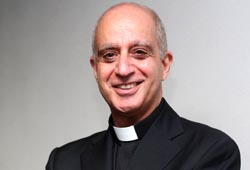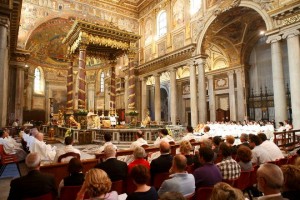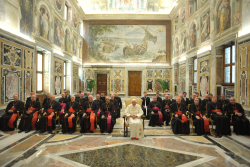The Clementine Hall of the Apostolic Palace was the setting of a meeting between the Holy Father and the Plenary Assembly of the Pontifical Council for Promoting the New Evangelization, led by Archbishop Rino Fisichella, the head of the Council and his collaborators, Bishop José Octavio Ruiz Arenas and Monsignor Graham Bell. This Council was formed by Benedict in 2010. The Pope’s address follows.
 I greet you all and thank you for what you do at the service of the New Evangelization, and for the work for the Year of Faith. My heartfelt thanks! What I would like to say to you today can be summarized in three points: primacy of witness; urgency of going out to encounter; pastoral program centered on the essential.
I greet you all and thank you for what you do at the service of the New Evangelization, and for the work for the Year of Faith. My heartfelt thanks! What I would like to say to you today can be summarized in three points: primacy of witness; urgency of going out to encounter; pastoral program centered on the essential.
In our time we often witness an attitude of indifference to faith, regarded as no longer relevant in man’s life. New Evangelization means to reawaken the life of faith in the heart and mind of our contemporaries. Faith is a gift of God, but it is important that we Christians show that we live the faith in a concrete way, through love, concord, joy, suffering, because this elicits questions, as at the beginning of the journey of the Church: Why do they live like this? What drives them? These are questions that go to the heart of evangelization, which is the witness of t faith and charity. What we need especially in these times are credible witnesses who with their life and also with the word render the Gospel visible, reawaken attraction for Jesus Christ, for God’s beauty.
So many people have fallen away from the Church. It’s a mistake to put the blame on one side or the other, in fact, it’s not about talking about fault. There are responsibilities in the history of the Church and of her men, in certain ideologies and also in individual persons. As children of the Church we must continue on the path of Vatican Council II, stripping ourselves of useless and harmful things, of false worldly securities which weigh down the Church and damage her true face.
There is need of Christians who render the mercy of God visible to the men of today, His tenderness for every creature. We all know that the crisis of contemporary humanity is not superficial but profound. Because of this the New Evangelization — while calling to have the courage to go against the current, to be converted from idols to the only true God –, cannot but use the language of mercy, made up of gestures and attitudes even before words. In the midst of today’s humanity the Church says: Come to Jesus, all you who labor and are heavy laden and you will find rest for your souls (cf. Matthew 11:28-30). Come to Jesus. He alone has the words of eternal life.
Every baptized person is a “cristoforo,” a bearer of Christ, as the ancient holy Fathers said. Whoever has encountered Christ, as the Samaritan woman at the well, cannot keep this experience to him/herself, but has the desire to share it, to bring Jesus to others (cf. John 4). It is for all of us to ask ourselves if one who meets us perceives in our life the warmth of faith, sees in our face the joy of having encountered Christ!
Here we move to the second aspect: the encounter, to go out to encounter others. The New Evangelization is a renewed movement towards him who has lost the faith and the profound meaning of life. This dynamism is part of the great mission of Christ to bring life to the world, the Father’s love to humanity. The Son of God “went out” of his divine condition and came to encounter us. The Church is within this movement; every Christian is called to go out to encounter others, to dialogue with those who do not think the way we do, with those who have another faith, or who don’t have faith. To encounter all because we all have in common our having been created in the image and likeness of God. We can go out to encounter everyone, without fear and without giving up our membership.
No one is excluded from the hope of life, from the love of God. The Church is sent to reawaken this hope everywhere, especially where it is suffocated by difficult existential conditions, at times inhuman, where hope does not breathe but is suffocated. There is need of the oxygen of the Gospel, of the breath of the Spirit of the Risen Christ, to rekindle it in hearts. The Church is the house whose doors are always open not only so that everyone can find welcome and breathe love and hope, but also because we can go out and bring this love and this hope. The Holy Spirit drives us to go out of our enclosure and guides us to the fringes of humanity.
In the Church all this, however, is not left to chance or improvisation. It calls for a common commitment to a pastoral plan that recalls the essential and that is “well centered on the essential, namely on Jesus Christ. It is no use to be scattered in so many secondary or superfluous things, but to be concentrated on the fundamental reality, which is the encounter with Christ, with his mercy, with his love, and to love brothers as He loved us. A project animated by the creativity and imagination of the Holy Spirit, who drives us also to follow new ways, with courage and without becoming fossilized! We could ask ourselves: how effective is the pastoral of our dioceses and parishes? Does it render the essential visible? Do the different experiences, characteristics, walk together in the harmony that the Spirit gives? Or is our pastoral scattered, fragmentary where, in the end, each one goes his own way?
In this context I would like to stress the importance of catechesis, as an instance of evangelization. Pope Paul VI already did so in the encyclical Evangelii nuntiandi (cf. n. 44). From there the great catechetical movement has carried forward a renewal to surmount the break between the Gospel and the culture and illiteracy of our days in the matter of faith. I have recalled several times a fact that has struck me in my ministry: to meet children who cannot even do the Sign of the Cross! Precious is the service carried out by the catechists for the New Evangelization, and it is important that parents be the first catechists, the first educators of the faith in their own family with their witness and with the word.
Thank you, dear friends, for this visit. Good work! May the Lord bless you and Our Lady protect you.



